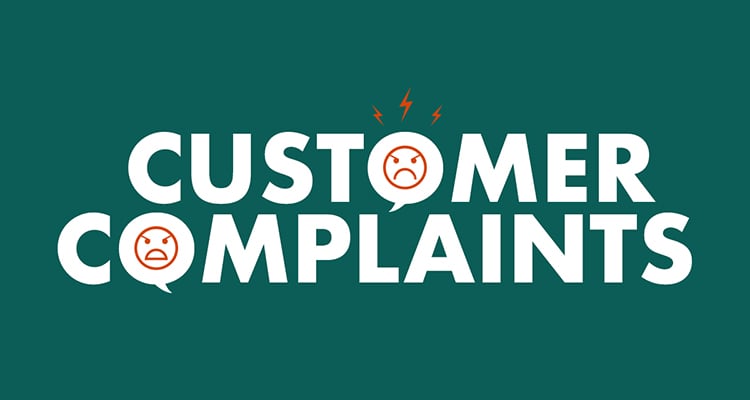Complaints & Redress
Introducing the Issue
Handling grievances and complaints in a timely and effective manner can have a significant business impact, with speedy resolution and redress increasing customer loyalty and peace of mind.
Do you welcome Customer Complaints and offer Redress?
What are your company’s current practices in regards to customer complaints and redress? Do you have policies or practices developed? Perhaps this isn’t an issue that you need to worry about right now? We’ve developed benchmarks that attempt to define Poor, Okay, Good and Excellent company performance standards on customer complaints and redress.
You are invited to assess your business against these benchmarks, for free and without obligation.
Complaints & Redress
Follow this link to:
1 – choose your score
2 – add a few lines by way of explanation to describe your policies and practices
3 – enter your email address so that we can get back to you
4 – submit
Nothing you submit will be published or shared.
Exploring the Issue
Your business will inevitably receive complaints and customer feedback at some point, regardless of what you are selling. There are certainly some factors that will increase the amount of complaints that you may receive including the size of your business (as large businesses are likely to have more customers and therefore more chances for people to be unhappy with the product or service) or the sector that your business is in (utilities, travel or banking are some of the most commonly complained about).
There are a wide variety of things that customers may complain about such as issues with the product or service you are providing, displeasure with the service provided by an employee, long or unclear delivery times, changes in prices or hidden costs.
Knowing how these complaints are made can be useful in resolving them quickly and helping your business moving forward. If your business has a customer service branch then complaints may be made to a customer service representative in person or over the phone. This form of complaint is extremely useful for both the business and the consumer as it provides a direct line of communication between the two, allowing for clear dialogue and a speedy solution to the problem.
With the increase of technology, you may receive complaints online as well. This includes emails and chat boxes between employees and consumers as well as online reviews on websites like Yelp.
People may also be complaining about your business through word of mouth to their communities and that can have an impact on your ability to recruit and maintain customers.
Lastly, if a customer feels as though the business has not done enough to solve the issue and that the damages they have accrued are severe, they may pursue legal solutions. This will be quite rare as most customers are looking for concrete solutions to their problems by obtaining delivery, repair, replacement or refund for a product or service, but it is possible for legal action to be taken, especially if the product caused harm to the customer.
No business can guarantee that they will never receive a complaint. So it is important to learn how to handle grievances and complaints in a timely and effective manner as it can have a positive business impact, with speedy resolution and redress increasing customer loyalty and peace of mind.
Benefits Of Addressing Complaints Effectively
While complaints can be challenging, they should never be dismissed out of hand and actually can have a lot of benefits for the business.
One of the major benefits of having an effective response to complaints is that you can actually increase consumer loyalty through your ability to respond to complaints. Research shows that customers who feel that their complaints have been listened to, taken on board and handled well become more loyal than if they had not had cause to complain in the first place. This can be really important for businesses as studies show that the success rate of selling to a customer you already have is 60-70%, while the success rate of selling to a new customer is 5-20%. Satisfying your current customers gives you the chance to maintain and create lasting relationships.
Acknowledging complaints also offers businesses the chance to not only save money but in some cases the chance to make more than their competitors. According to a study done by Invesp, the cost of gaining a new customer is estimated to be at least five times higher than maintaining an existing one, which can have a significant impact on your bottom line. By focusing on solving complaints you can gain more loyal customers that will be willing to buy from you again in the future. Another study conducted by Bain & Company found that businesses can grow revenues between 4 and 8 percent above their market when they prioritise better customer service experiences.
In some cases, complaints may suggest a larger issue with the business, product, or service. The dialogue within a complaints process can provide an opportunity for constructive ideas about improving products, adapting marketing practices, upgrading services, or modifying promotional material and product information. It may be tempting to write off the opinions of “picky” customers, but they may actually be voicing an issue that many more customers subconsciously pick up on that is harming their view of the company.
Ways To Provide Effective Customer Service
Generally speaking, dissatisfied consumers just want their problems to be recognised, validated, and solved. It is recommended for any company to have a designated complaint procedure that is easy for customers to use and employees to respond to. Developing a complaint procedure within your business strategy allows employees to have a clear set of steps to follow when addressing concerns. Here are some other recommendations that you can add into a customer service policy to solve complaints quickly and effectively.
Research the most common issues, complaints and concerns about your company and train employees how to respond to those problems specifically.
Provide a statement on how you intend to treat your consumers, even if that may seem obvious. This tells customers who read it that you are taking an official stance regarding courtesy and manners and that you are serious about it.
State your company’s promises clearly and concisely. Customers are likely to feel angry when promises made by a business are not fulfilled so only make realistic and achievable promises.
Include the code of conduct for employees. By including the code of conduct in your customer service policy, your business can ensure that every employee provides the same, consistent support as the next.
Change the policy over time if new issues and concerns arise. Being adaptable allows your business the chance to arise to new challenges and informs your customers that you are dedicated to providing the best service possible.
It is also important to have a clear structure of responsibility and authority to help solve consumer problems quickly and effectively. Developing a culture in your workplace where staff are open to receiving complaints helps them use the information to improve the company. This process requires objectivity and impartiality while confidentiality may be necessary as a safeguard to ensure fairness. Employees whose primary responsibility is sales or service, for example, may not be able to be objective if they feel their personal performance is being criticised. So an organisational culture with a philosophy of respect for the customer and a willingness to accept criticism, can be established from the very top to address this.
Definitions
Alternative Dispute Resolution refers to any method of resolving disputes without litigation. ADR regroups all processes and techniques of conflict resolution that occur outside of any governmental authority. The most famous ADR methods are the following: mediation, arbitration, conciliation, negotiation, and transaction.
Complaints occur when a customer brings a problem to the attention of the organisation and expects some redress, probably over and above simply supplying the original product or service that was the cause of the complaint.
Customer Centricity is the idea of understanding customer situation, perception, and/or expectations by focusing on the customer. Customer Centricity focuses on providing a positive customer experience before and after the sale.
Consumer Redress is the right of a consumer to seek settlement of claims, covering not only direct losses but also damages over goods bought or services rendered.
Customer Service refers to the assistance from companies towards people who are looking to purchase their products/services. Customer Service is the idea of meeting customer expectations, ultimately increasing customer loyalty and company revenue.
Direct Loss refers to any losses, liabilities, expenses, damages, costs and claims arising directly as a result of the one party’s failure to perform its obligations under an agreement.
Guarantees are formal promises or assurances (typically in writing) that certain conditions will be fulfilled, especially that a product will be repaired or replaced if not of a specified quality and durability
Loyalty Business Model is a strategic management approach that is customer-centric. This is done to increase the loyalty of customers and/or stakeholders in the expectation that objectives will be met or surpassed.
Patience refers to the ability to endure difficult situations, allowing an understanding of customer needs/expectations while improving company services.
Professionalism refers to the traits needed to consistently achieve high standards in conduct and qualities that characterise a business.
Redress means to rectify an undesirable situation.
Warranties are written guarantees, issued to the purchaser of an article by its manufacturer, promising to repair or replace it if necessary within a specified period of time.
Articles & Resources

Evri says sorry for UK parcel delivery delays but offers no means of gaining redress
BBC
Courier giant changes name from Hermes to Evri to escape bad customer service reputation but fails to improve?

Customer Complaints: Why Angry Customers Are Good for Business
SuperOffice
Customer complaints are important. And there’s no better way to collect direct feedback from your customers and improve your product or service.

6 Brands Doing Complaints Management Perfectly on Social Media
Apex Global
Here are some great examples of how companies are succeeding at complaints management with social customer care.
